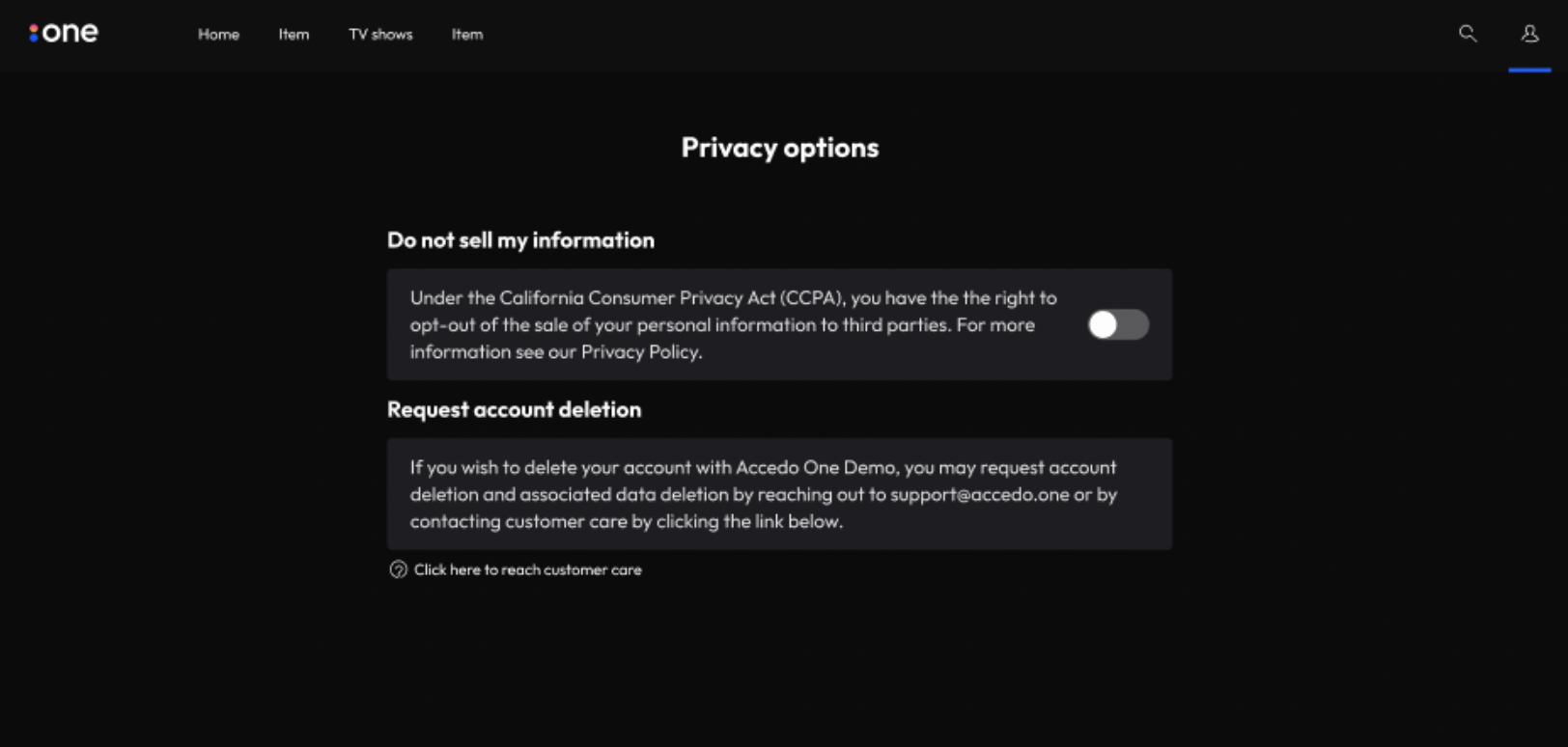Knowledge Hub > ARTICLES
Meeting data privacy regulations is an essential component in any digital presence. We describe GDPR and CCPA, and explain how Accedo One supports consent management through third party integrations.

For businesses operating in today's digital marketplace, data privacy isn't just a legal checkbox; it's a critical component of brand reputation. The advent of comprehensive regulations - like the General Data Protection Regulation (GDPR) and the California Privacy Act (CCPA) - has set a new global benchmark for how personal information must be handled.
Ignoring these powerful mandates can lead to significant penalties and a loss of consumer confidence. Understanding these regulations and implementing proper compliance measures is essential for modern businesses.
The General Data Protection Regulation took effect in 2018. The GDPR represents one of the most comprehensive privacy laws globally, applying to any organization that processes personal data of EU residents - regardless of where the organization is located.
GDPR establishes strict principles for data processing, requiring organizations to demonstrate lawful basis for collecting personal data and implement data minimization practices.
The most important data protection principles according to the GDPR:
GDPR grants EU residents extensive rights including the right to access their data, request corrections, demand erasure ("right to be forgotten"), restrict processing, and object to certain data uses.
Organizations must implement appropriate security measures, conduct privacy impact assessments for high-risk activities, and report data breaches within 72 hours.
GDPR official sources:
The California Consumer Privacy Act, effective from 2020, applies to for-profit businesses meeting specific thresholds: annual revenues exceeding $25 million, processing data of 100,000+ California residents annually, or deriving 50%+ of revenue from selling California residents' data.
Under CCPA, California residents have several key rights:
Right to Non-Discrimination: Businesses cannot discriminate against consumers for exercising their CCPA rights.

To meet this requirement, businesses are required to provide clear links on their websites titled "Do Not Sell or Share My Personal Information" if they engage in such practices. Organizations must also implement reasonable security measures to protect personal information and provide clear privacy policies detailing their data practices.
CCPA official sources:
Both regulations require comprehensive data mapping, robust consent management systems, processes for handling individual rights requests, and detailed record-keeping.
Accedo One provides ready-made integrations with your choice of two privacy management OTT vendors in case either GDPR or CCPA requirements apply to you. With both solutions, you will set up, manage and track consent management in specialized tools.
OneTrust: comprehensive consent management
OneTrust offers a broad scope for privacy, security and data governance compliance without specializing in a particular industry. Accedo One’s integration gives you access to:
Sourcepoint: specialized consent solutions
Sourcepoint focuses specifically on consent management for digital publishers and media companies, in particular with regards to digital advertising and user data.
In addition to these, Accedo One optionally provides a “Terms and Conditions” popup, requiring a first time user to read and accept the service’s terms and conditions prior to accessing the application.
Should you choose OneTrust or Sourcepoint? There is no easy answer to this - both platforms offer thorough consent management options and a user management interface where you configure your choices. OneTrust is aimed at a wider variety of industries, while Sourcepoint is specifically focused on media. If you are interested in exploring a CMP (consent management platform), a good approach is to evaluate both platforms and choose the one that is a better fit for your needs.
If either GDPR or CCPA apply to you and you would like to explore adding one of our integrations to your portfolio, speak to your Customer Success Manager to make them aware of the upcoming requirement. You will need to form a commercial relationship with the CMP vendor you end up choosing.
Speak with one of our video experts to see how far your video service can go.
Contact Us
Lorem ipsum dolor sit amet, consectetur adipiscing elit. Suspendisse varius enim in eros elementum tristique. Duis cursus, mi quis viverra ornare, eros dolor interdum nulla, ut commodo diam libero vitae erat. Aenean faucibus nibh et justo cursus id rutrum lorem imperdiet. Nunc ut sem vitae risus tristique posuere.